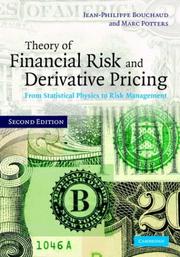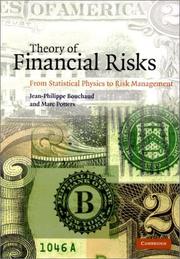| Listing 1 - 10 of 12 | << page >> |
Sort by
|
Book
ISBN: 1316998886 1108639062 131665933X Year: 2018 Publisher: Cambridge : Cambridge University Press,
Abstract | Keywords | Export | Availability | Bookmark
 Loading...
Loading...Choose an application
- Reference Manager
- EndNote
- RefWorks (Direct export to RefWorks)
The widespread availability of high-quality, high-frequency data has revolutionised the study of financial markets. By describing not only asset prices, but also market participants' actions and interactions, this wealth of information offers a new window into the inner workings of the financial ecosystem. In this original text, the authors discuss empirical facts of financial markets and introduce a wide range of models, from the micro-scale mechanics of individual order arrivals to the emergent, macro-scale issues of market stability. Throughout this journey, data is king. All discussions are firmly rooted in the empirical behaviour of real stocks, and all models are calibrated and evaluated using recent data from Nasdaq. By confronting theory with empirical facts, this book for practitioners, researchers and advanced students provides a fresh, new, and often surprising perspective on topics as diverse as optimal trading, price impact, the fragile nature of liquidity, and even the reasons why people trade at all.
Capital market. --- Stocks. --- Futures. --- Investments.

ISBN: 0521819164 0521741866 1107135680 1139636995 0511169647 0511069979 0511308485 0511753896 1280430575 0511205627 051106151X 9780511061516 9780511055188 0511055188 9780511753893 9780511205620 9780521819169 9780521741866 9781107135680 9781139636995 9781280430572 9780511169649 9780511069970 9780511308482 Year: 2003 Publisher: Cambridge
Abstract | Keywords | Export | Availability | Bookmark
 Loading...
Loading...Choose an application
- Reference Manager
- EndNote
- RefWorks (Direct export to RefWorks)
Risk control and derivative pricing have become of major concern to financial institutions, and there is a real need for adequate statistical tools to measure and anticipate the amplitude of the potential moves of the financial markets. Summarising theoretical developments in the field, this 2003 second edition has been substantially expanded. Additional chapters now cover stochastic processes, Monte-Carlo methods, Black-Scholes theory, the theory of the yield curve, and Minority Game. There are discussions on aspects of data analysis, financial products, non-linear correlations, and herding, feedback and agent based models. This book has become a classic reference for graduate students and researchers working in econophysics and mathematical finance, and for quantitative analysts working on risk management, derivative pricing and quantitative trading strategies.
339.72 --- 519.2 --- Finance --- Financial engineering --- Risk assessment --- Risk management --- Analysis, Risk --- Assessment, Risk --- Risk analysis --- Risk evaluation --- Computational finance --- Engineering, Financial --- Funding --- Funds --- 519.2 Probability. Mathematical statistics --- Probability. Mathematical statistics --- 339.72 Internationaal betalingsverkeer. Valutahandel. Wisselmarkten. Deviezenhandel. Internationale kapitaalmarkt. Flow and funds analysis. Betalingsbalans. Internationale geldmarkt. --- Internationaal betalingsverkeer. Valutahandel. Wisselmarkten. Deviezenhandel. Internationale kapitaalmarkt. Flow and funds analysis. Betalingsbalans. Internationale geldmarkt. --- Insurance --- Management --- Evaluation --- Economics --- Currency question --- Internationaal betalingsverkeer. Valutahandel. Wisselmarkten. Deviezenhandel. Internationale kapitaalmarkt. Flow and funds analysis. Betalingsbalans. Internationale geldmarkt --- Capital structure --- 658.155 --- 305.91 --- 333.605 --- 336.312.3 --- 339.4 --- AA / International- internationaal --- Econometrie van de financiële activa. Portfolio allocation en management. CAPM. Bubbles --- Nieuwe financiële instrumenten --- Solvabiliteit, kredietwaardigheid van de landen. Risicolanden --- Vermogensbeheer. Financiële analyse. Verspreiding van de beleggingsrisico's --- Finance. --- Financial engineering. --- Risk assessment. --- Risk management. --- Physics --- General and Others

ISBN: 0521782325 0511046235 051115125X 0511010281 9780511010286 9780511030987 0511030983 9780511151255 9780511046230 9780521782326 Year: 2000 Publisher: Cambridge New York, NY Port Melbourne, Australia
Abstract | Keywords | Export | Availability | Bookmark
 Loading...
Loading...Choose an application
- Reference Manager
- EndNote
- RefWorks (Direct export to RefWorks)
This book summarizes recent theoretical developments inspired by statistical physics in the description of the potential moves in financial markets, and its application to derivative pricing and risk control. This book will be of interest to physicists, quantitative analysts in financial institutions, risk managers and graduate students in mathematical finance.
Statistical physics --- International financial management --- Finance --- Financial engineering --- Risk assessment --- Risk management --- Finances --- Ingénierie financière --- Evaluation du risque --- Gestion du risque --- 339.72 --- 519.2 --- Insurance --- Management --- Analysis, Risk --- Assessment, Risk --- Risk analysis --- Risk evaluation --- Evaluation --- Computational finance --- Engineering, Financial --- Funding --- Funds --- Economics --- Currency question --- Internationaal betalingsverkeer. Valutahandel. Wisselmarkten. Deviezenhandel. Internationale kapitaalmarkt. Flow and funds analysis. Betalingsbalans. Internationale geldmarkt. --- Probability. Mathematical statistics --- Finance. --- Financial engineering. --- Risk assessment. --- Risk management. --- 519.2 Probability. Mathematical statistics --- 339.72 Internationaal betalingsverkeer. Valutahandel. Wisselmarkten. Deviezenhandel. Internationale kapitaalmarkt. Flow and funds analysis. Betalingsbalans. Internationale geldmarkt. --- Ingénierie financière --- Internationaal betalingsverkeer. Valutahandel. Wisselmarkten. Deviezenhandel. Internationale kapitaalmarkt. Flow and funds analysis. Betalingsbalans. Internationale geldmarkt
Book
ISBN: 2727201907 9782727201908 Year: 1997 Publisher: Paris: CEA,
Abstract | Keywords | Export | Availability | Bookmark
 Loading...
Loading...Choose an application
- Reference Manager
- EndNote
- RefWorks (Direct export to RefWorks)
Finances --- Valeurs mobilières --- Options (Finances) --- Gestion du risque --- Modèles mathématiques. --- Modèles mathématiques --- Risk management --- Finance --- 658.15 --- Funding --- Funds --- Economics --- Currency question --- Insurance --- Management --- Finances - Gestion du risque - Modèles mathématiques. --- Valeurs mobilières - Modèles mathématiques --- Options (Finances) - Modèles mathématiques --- option --- marché à terme --- risque financier --- probabilités --- FINANCE --- FINANCIAL RISK --- RISK MANAGEMENT --- MATHEMATICAL MODELS
Book
ISBN: 9782717860702 Year: 2013 Publisher: Paris Economica
Abstract | Keywords | Export | Availability | Bookmark
 Loading...
Loading...Choose an application
- Reference Manager
- EndNote
- RefWorks (Direct export to RefWorks)
Book
ISBN: 1108846831 1108858279 1108768903 Year: 2021 Publisher: Cambridge : Cambridge University Press,
Abstract | Keywords | Export | Availability | Bookmark
 Loading...
Loading...Choose an application
- Reference Manager
- EndNote
- RefWorks (Direct export to RefWorks)
The real world is perceived and broken down as data, models and algorithms in the eyes of physicists and engineers. Data is noisy by nature and classical statistical tools have so far been successful in dealing with relatively smaller levels of randomness. The recent emergence of Big Data and the required computing power to analyse them have rendered classical tools outdated and insufficient. Tools such as random matrix theory and the study of large sample covariance matrices can efficiently process these big data sets and help make sense of modern, deep learning algorithms. Presenting an introductory calculus course for random matrices, the book focusses on modern concepts in matrix theory, generalising the standard concept of probabilistic independence to non-commuting random variables. Concretely worked out examples and applications to financial engineering and portfolio construction make this unique book an essential tool for physicists, engineers, data analysts, and economists.
Book
ISBN: 1108488080 9781108488082 9781108768900 Year: 2021 Publisher: Cambridge Cambridge University Press
Abstract | Keywords | Export | Availability | Bookmark
 Loading...
Loading...Choose an application
- Reference Manager
- EndNote
- RefWorks (Direct export to RefWorks)

ISBN: 1281057347 9786611057343 0080550592 0444530061 9780444530066 9780080550596 Year: 2007 Publisher: Amsterdam, Netherlands Boston, Mass. Elsevier
Abstract | Keywords | Export | Availability | Bookmark
 Loading...
Loading...Choose an application
- Reference Manager
- EndNote
- RefWorks (Direct export to RefWorks)
There has been recently some interdisciplinary convergence on a number of precise topics which can be considered as prototypes of complex systems. This convergence is best appreciated at the level of the techniques needed to deal with these systems, which include: 1) A domain of research around a multiple point where statistical physics, information theory, algorithmic computer science, and more theoretical (probabilistic) computer science meet: this covers some aspects of error correcting codes, stochastic optimization algorithms, typical case complexity and phase transitions, constr

ISBN: 9780444530066 0444530061 Year: 2007 Publisher: [Place of publication not identified] Elsevier Science
Abstract | Keywords | Export | Availability | Bookmark
 Loading...
Loading...Choose an application
- Reference Manager
- EndNote
- RefWorks (Direct export to RefWorks)
There has been recently some interdisciplinary convergence on a number of precise topics which can be considered as prototypes of complex systems. This convergence is best appreciated at the level of the techniques needed to deal with these systems, which include: 1) A domain of research around a multiple point where statistical physics, information theory, algorithmic computer science, and more theoretical (probabilistic) computer science meet: this covers some aspects of error correcting codes, stochastic optimization algorithms, typical case complexity and phase transitions, constraint satisfaction problems. 2) The study of collective behavior of interacting agents, its impact on understanding some types of economical and financial problems, their link to population and epidemics dynamics, game theory, social, biological and computer networks and evolution. The present book is the written version of the lectures given during the Les Houches summer school session on "Complex Systems", devoted to these emerging interdisciplinary fields. The lectures consist both in a number of long methodological courses (probability theory, statistical physics of disordered systems, information theory, network structure and evolution, agent-based economics and numerical methods) and more specific, 'problem oriented' courses. Lecturers are all leading experts in their field; they have summarized recent results in a clear and authoritative manner. The "Les Houches lecture notes" have a long tradition of excellence and are often found to be useful for a number of years after they were written. The book is of interest to students and researchers with various backgrounds: probability theory, computer science, information theory, physics, finance, biology, etc. Topical and comprehensive survey of the emerging, interdisciplinary field of "Complex Systems", covered by recognized world experts "Les Houches lectures notes": a long tradition of excellence and long-lasting impact Of interest to a broad audience (mathematics, physics, biology, informatics, finance, geology, etc.) Some applications may have concrete impact Selected topics in complex systems: forefront of research in the field.
Book
Year: 2020 Publisher: Cambridge, Mass. National Bureau of Economic Research
Abstract | Keywords | Export | Availability | Bookmark
 Loading...
Loading...Choose an application
- Reference Manager
- EndNote
- RefWorks (Direct export to RefWorks)
We construct a model of an exchange economy in which agents trade assets contingent on an observable signal, the probability of which depends on public opinion. The agents in our model are replaced occasionally and each person updates beliefs in response to observed outcomes. We show that the distribution of the observed signal is described by a quasi-non-ergodic process and that people continue to disagree with each other forever. These disagreements generate large wealth inequalities that arise from the multiplicative nature of wealth dynamics which make successful bold bets highly profitable.
| Listing 1 - 10 of 12 | << page >> |
Sort by
|

 Search
Search Feedback
Feedback About UniCat
About UniCat  Help
Help News
News